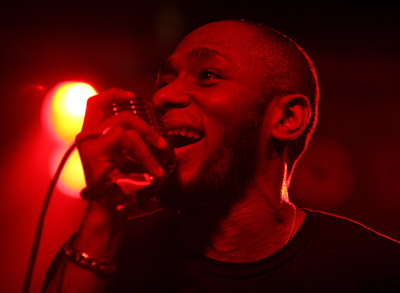
He's not one of those wack rappers who raps to makes money. It was just crazy how his innate sense of beat and lyric. It was crazy just to see him drop those sick lyrics, then transition into a new beat. One point during the night, he stopped the beat and started spitting Biggie's "It Was All A Dream" with the audience. He's a humble man who loves rapping and loves rocking to beat. I've always loved Mos Def, but there was something so alive about his performance. The background was black almost like we were in a big black box theater, and he just stood there, walked from right to left of the stage and rapped.

He came out wearing completely unassuming clothes: white shirt, white pants, a gray jacket and a red cap. I saw him live August 2012, will never forget nor regret that experience. It's just him on the stage rocking the mic, spitting lyrics ferociously. Mos Def doesn't rely on antics or lame gimmicks for his musical performances. If you're looking for a spiritual experience, you need to see this MC in person. Mos Def is one of the most lyrically talented MC's of this generation. Most recently he starred in a short film showing the methods of force feeding used in Guantanamo Bay and like everything Mos has been involved in it was moving and high quality work. Topping off his role as Brooklyn’s true Renaissance man he is also involved in political activism. Whilst many have never tried much more than playing lazy cartoon versions of themselves (we all enjoyed Get Rich Or Die trying though), Mos has appeared in everything from films like ‘The Hitchhikers Guide To The Galaxy’ to what many considered an Emmy worthy appearance in TV’s House. Mos has also one of many rappers to try it out in the acting world, however it’s pretty easy to state the case that no one has done it as well as Mos. Even when he himself is not present though, his influence remains in rappers like Jay Electronica and Lupe Fiasco. Recently he has only been seen musically on guest features and collaborations be it as part of Kanye West’s GOOD Friday or with The Robert Glasper Experiment. He followed this up by launching his solo career with debut album ‘Black On Both Sides’ and many more after, always praised for his jazzy, melodic style and complex and insightful lyricism. You can’t get on Iran’s back and say, ‘You can’t have nuclear arms, but we can.’ Oppenheimer was right: we should have never built this shit to begin with.He came onto the scene as part of Black Star and their 1998 album, a collaboration with Brooklyn’s Talib Kweli is now considered an underground classic.

Earlier still, in an appearance on Real Time with Bill Maher in 2009 - one that he was later mocked for - he said, “The nuclear club should be disbanded because America has proven that there’s no country who’s really going to be responsible with this shit. For example, in this 2013 video he voluntarily goes through a Guantanamo Bay force-feeding procedure. Like the prophets, Bey considers all of his work a conduit for change, and himself a moral arbiter who warns the masses, not of God, but of the world’s many injustices. As Muhammad Asad states in his 1980 book The Message of The Qur’an, one of the surah’s primary lessons is “the problem of man’s moral responsibility.” But the townspeople scoff at their message, calling the prophets liars. In this chapter, three divine prophets are sent to a village to teach non-believers about the significance of God. While Bey has never explicitly stated why he chose Yasiin, its connection to Yāʾ-Sīn, the 36th surah of the Qur’an, is apt. In 2011, seven years after The New Danger, he underlined his commitment by officially dropping his Mos Def moniker for Yasiin Bey, the name his friends and family had been calling him since the late ‘90s. In the midst of worldwide Islamophobia, Bey has proudly put his Muslim faith on display, starting each of his albums by reciting the Arabic phrase “Bismillah al-Rahman al-Rahim” - which loosely translates as “In the name of Allah, the beneficent, the merciful” - and speaking extensively about his beliefs in speeches and interviews. Though Bey’s work has often moved in experimental tangents, one thing that’s remained consistent is his devotion to his religion.


 0 kommentar(er)
0 kommentar(er)
